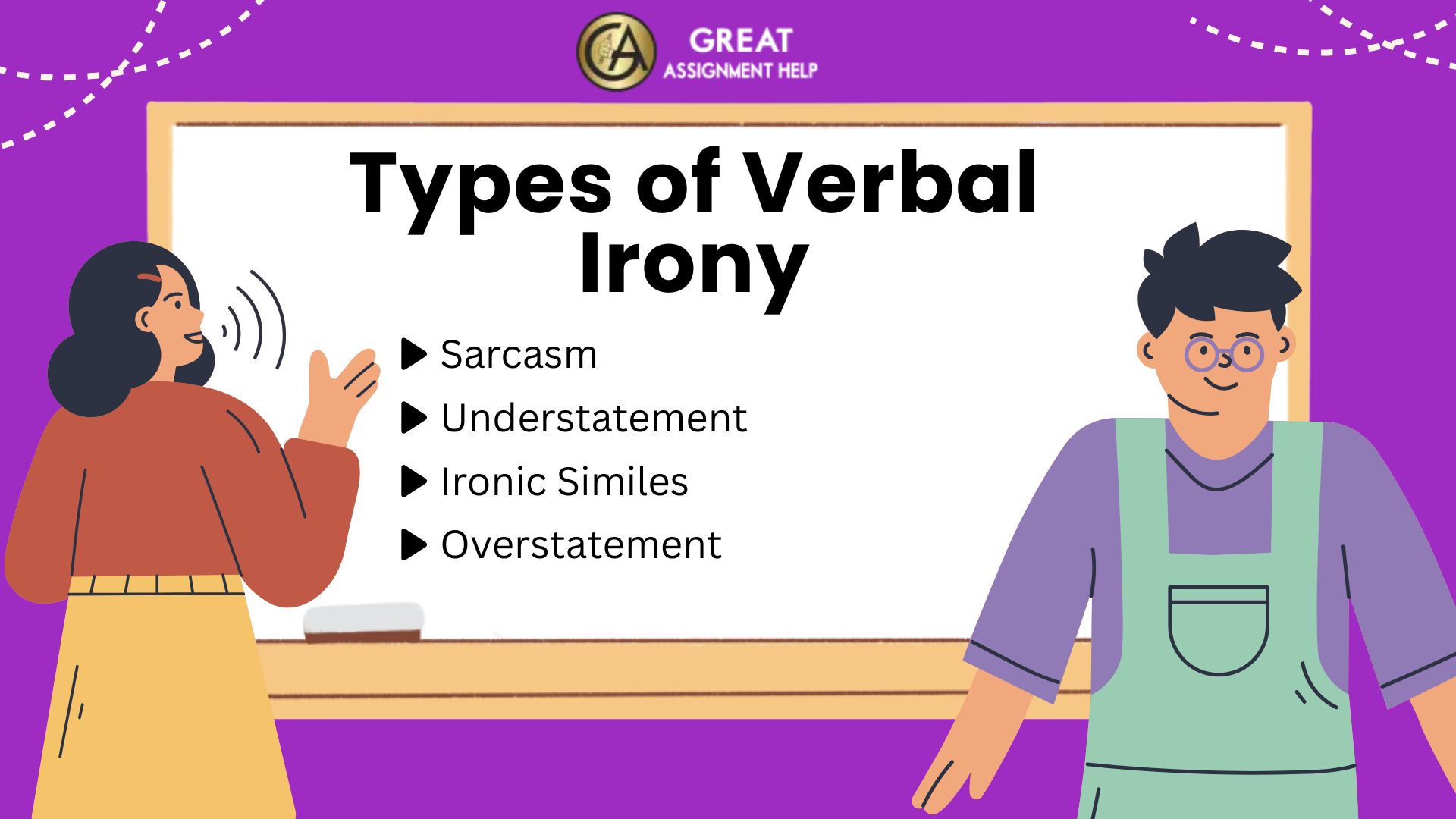In Literature, irony is when words are used to convey a meaning different from their literal meaning. Typically, irony is classified into three types. They are verbal irony, situational irony, and dramatic irony. All these ironies have a separate meaning with different purposes. Among them, verbal irony is a figure of speech we use in our daily life, often without even realizing it. Verbal irony is when we say one thing but mean the opposite. To learn more about verbal irony in literature and clear all your doubts about this rhetorical device, read this blog. Here, we have comprehensively discussed the definition, types, and examples of verbal irony.
Definition of Verbal Irony
What is Verbal Irony? In literature, verbal irony refers to saying one thing that is the opposite of its true meaning. In verbal irony, the words and their literal meaning will never match. These are some examples of verbal irony
- Saying “lovely weather” during a terrible hurricane.
- Claiming “I’m fine” or “I’m not hurt” when you are badly injured.
Verbal irony will occur when words contradict reality. You can find verbal irony in plays, literature, and speeches. Unlike other types of irony, some speakers will intentionally use verbal irony to say something very different from what is true.
To figure out if someone is using verbal irony, look at what they intend to convey. If they are saying the opposite of what they originally meant to make a point or highlight something, then it is verbal irony.
Generally, verbal irony relies on context, tone, and understanding between the speaker and listener. In literature, readers will usually have enough information to catch the irony. Verbal irony is always intentional and not accidental. If someone doesn’t mean to be ironic, then it is not verbal irony.
Many people commonly misunderstand verbal irony as lying, but they are not the same. Verbal irony is when you say the opposite of what you mean, particularly to make a point or be humorous. On the other hand, sarcasm is a form of mockery where words are used to hurt or mock someone. The key difference is that verbal irony will not necessarily be negative or mean to deceive, while sarcasm will typically have a negative intention. If you are a literature student, then you must understand this difference.
Uses of Verbal Irony
Verbal irony is a literary device that serves many purposes. Often, writers use verbal irony in their work to
- create humor and make readers laugh
- highlight contradictions, hypocrisies, or absurdities
- convey a deeper meaning that’s understood by some
- mock or poke fun at overused words or phrases
Types of Verbal Irony

Irony can be used to add humor, romance, or comedy to a situation or a conversation. Typically, verbal irony will be in different forms. The following are some common types of verbal irony
Sarcasm
Sarcasm is a form of verbal irony. It comes from the Greek word “sarkasmos,” which means “to tear flesh”. People often use it to mock or criticize someone in a taunting way. Sarcasm can be bitter and hostile. However, it can also be positive depending on the tone you use. Some people argue that sarcasm and verbal irony are different, with sarcasm being harsher and used to ridicule others. Not all sarcastic sentences are verbal irony, but all verbal irony can potentially be sarcastic.
Oscar Wilde’s writing, like “The Importance of Being Earnest,” is a great example of sarcasm in literature. His quote, “I am glad to say that I have never seen a spade,” is a sarcastic remark that implies the opposite of what he is saying.
Understatement
Understatement is another form of verbal irony. You can use understatement to downplay the importance of something. Usually, this form of verbal irony involves saying less than what is meant, often for humor or effect. The following are some examples
- Saying “no big deal” when something is a big achievement.
- Commenting “it’s not hot” when it’s extremely hot outside.
- Referring to a large house as “small”.
- Saying “I’m not a good cook” when you are a skilled chef.
Ironic Similes
Ironic Similes focuses on pretending to be something you are not. It often conveys a false impression. You can see ironic similes in body language that contradict your true feelings. These are some examples of ironic similes
- Smiling when you are not truly happy.
- Pretending to be something you are not, like acting high or sad, to manipulate others’ perceptions.
- Using insincere behavior to gain sympathy or approval.
You can use this type of behavior to influence others. Often, in politics, politicians use ironic similes to create a positive impression and win votes.
Overstatement
Overstatement, also known as hyperbole, is a form of irony you can use when exaggerating to make a point. This form of irony involves saying more than what is true to create a strong impression. Words like “literally” are often used to exaggerate a statement. When used this way, it is clear the speaker doesn’t mean it literally. Overstatement comes from the Greek word “hyperbole,” which refers to going beyond the truth.
Examples of Verbal Irony in Literature
Verbal irony is a common literary device used by authors to convey meaning that is the opposite of what is explicitly stated. Here are some famous examples of verbal irony in literature
- In Shakespeare’s Julius Caesar, Mark Antony says, “Brutus is an honorable man.” Here, he was not genuinely praising him. Instead, Antony’s words were ironic because he was criticizing Brutus and the other assassins. By saying the opposite of what he means, Antony cleverly manipulated the crowd’s views about Brutus.
- Oscar Wilde’s character, Lord Goring, says, “I am not at all romantic” and claims romance is only for older people. However, this is ironic because Lord Goring’s actions show he is romantic at heart. He is always flirting, concerned with his appearance, and entangled in complicated love affairs. By saying he is not romantic, Lord Goring means the opposite. Here, Wilde has used verbal irony to add depth and humor to Lord Goring’s character.
Real-Life Verbal Irony Examples
Verbal irony is an important concept you must know, especially when writing literature or English assignments. To understand the concept better and how it is used in real-time, read different examples of verbal irony. Here are some verbal irony examples
- Saying “What a lovely day!” during a hectic situation.
- Commenting, “Wow, this is fantastic,” when your laptop is not working.
- After a bad day, jokingly saying, “My favorite part was missing my train.”
How to Include Verbal Irony in Fiction Writing
When you are involved in fictional writing, it might be tricky for you to use verbal irony. This is because your readers cannot see your tone or facial expression. However, by following these tips, you can write a verbal irony
- Use a description to clarify the meaning. For example, you can have a character “smirk” or display “mock-innocence” to show they are being ironic.
- Consider your character’s intent and personality. Think about how they interact with others and whether they typically use irony.
- Don’t be afraid to exaggerate the irony slightly to make it clear to your reader. You can do this by emphasizing certain words, adding non-verbal cues, or showing an over-the-top reaction.
Wrapping Up
Verbal irony is an effective rhetorical device with which you can express yourself humorously while communicating. You can also use this technique in your literary work to make a point or create a dramatic effect. If you are an English literature student, then you must have a strong understanding of verbal irony and other figures of speech to do your assignments. In case you are still confused about verbal irony or if it is challenging for you to write your assignments on topics related to it, take our literature assignment help online. As per your needs, our team’s top literary experts will guide you in writing your English literature assignments effectively.



